The German Races
From the Handbook for Schooling the Hitler Youth
Chapter Two: The German Races (for Chapter One, see here)
Introduction: The material in the following Handbook series comes from a booklet of material assembled specificially for Hitler Youth leaders. It was arranged by Fritz Bennecke (ed.) into a book titled Vom deutschen Volk und seinem Lebensraum. Handbuch für die Schulung in der HJ, ("The German people and their habitat. Manual for the training in the HJ", Munich: Franz Eher, 1937). Paul Gierlichs is listed as Bearbeiter.
This was translated to be printed and sold in England. For this English language volume, the title was inexplicably changed to "The Nazi Primer," a book that can be purchased from most book sellers today.
Chapter One titled The Unlikeness of Men, more of an introduction, can be found in my previous post here. The word men at the time represented both males and females – no gender-political correctness then. It emphasized the fourth point of the NSDAP program: Only those who are comrades of our folk can be citizens of the state. Only those who are of German blood, irrespective of religious belief, can be comrades of our folk. Consequently no Jews can be comrades of our folk. -cy
* * *
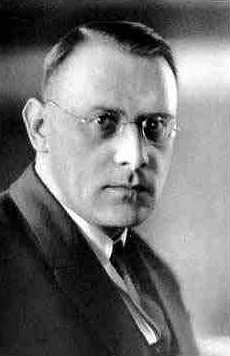
THIS MUCH LONGER CHAPTER (two) gives the students an overview of the various “races” that make up the German people – their people. There are six distinct groups described, ranging from the 'Nordic,' the largest which makes up approximately 50% of the population, to the 'Western' making up only 2%. In between, from greater to lesser, are the 'Eastern', the 'Dinaric', the 'East Baltic' and the 'Phalic.'
From Hans F. K. Gunther's (pictured left) book Rassenkunde des deutschen Volkes (1933), it is quoted:
A race is a collection of individuals differentiated from every other group by its unique combination of bodily characteristics and soul attributes and continually reproduces its own kind.
The students were taught that pure races of people scarcely exist today. Individuals have everywhere intermingled. Many people in Europe have preserved above all the Nordic character; others the Western, or Eastern, or East Baltic and so forth. Since man is body, mind and soul, the mental and spiritual characteristics are considered along with physical structure.
Geographical distribution of races in the German Reich
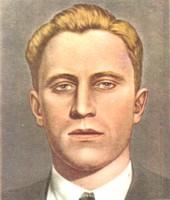 According to Gunther, who was the leading racial theorist for the Third Reich, Nordics are found in Germany and in large sections of the lands of northern Europe, in Scotland, Denmark, on the Baltic coast, in Sweden and Norway.
According to Gunther, who was the leading racial theorist for the Third Reich, Nordics are found in Germany and in large sections of the lands of northern Europe, in Scotland, Denmark, on the Baltic coast, in Sweden and Norway.
They are tall, an average 1.75 meters for the matured man, and slender, with large limbs in proportion to the body. The Nordic skull is long and narrow, the face small, the nose high set and small relative to the rest of the face. The skin is rosy-white and delicate, the light-colored hair is smooth, wavy, thin and fine. Sexual maturity comes relatively late, as does the onset of old age.
The Nordic is distinguishable from other “races” even to the structure and size of the brain and bodily glands. He is uncommonly gifted mentally, outstanding in truthfulness and energy, and power of judgment. Nordics are inclined to be taciturn and cautious, to dislike loudness, are persistent in sticking to a project when once set upon it. They are natural leaders.
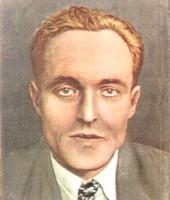 The Nordic “race” is most closely associated with the Phalic, which make up only 5% of the German population. They are commonly found in Westphalia, from whence derives the name, but also in Swabia and Wuerttemberg. They surpass the Nordic in height and breadth, acting generally more forcefully. The skull is broader but just as long, the nose broader, the skin the same rosy-white, hair blond with sometimes a tinge of reddish, wavy or even curly.
The Nordic “race” is most closely associated with the Phalic, which make up only 5% of the German population. They are commonly found in Westphalia, from whence derives the name, but also in Swabia and Wuerttemberg. They surpass the Nordic in height and breadth, acting generally more forcefully. The skull is broader but just as long, the nose broader, the skin the same rosy-white, hair blond with sometimes a tinge of reddish, wavy or even curly.
As to soul qualities, the two are very similar, with the Phalic type less emotional, less fool-hardy, more good-natured and cordial, patient, and governed by a strong feeling of loyalty. These two are more related to one another than to any of the other four German “races.”
The Western and Dinaric racial groups
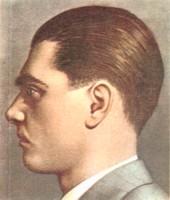 What's named by Gunther as the Western “race” (also called Mediterranean) is not only the smallest in Germany, amounting to only 2% of total, but hardly occurs in it's pure form. It's found principally in the Rhineland, and in England, France and the Pyrenees. The Western is slender like the Nordic but not as tall, averaging only 1.61 meters, with the same long skull and small face, but the skin is tinted with a light brown. The hair is smooth and fine, sometimes curly, colored dark brown to black, with brown eyes. As to soul qualities, they have less patience and steadiness than the other two; are excitable, even passionate; given to act more by feeling than by reason. They are more talkative and lively, mentally agile but with less creative power. They've produced only a few outstanding men.
What's named by Gunther as the Western “race” (also called Mediterranean) is not only the smallest in Germany, amounting to only 2% of total, but hardly occurs in it's pure form. It's found principally in the Rhineland, and in England, France and the Pyrenees. The Western is slender like the Nordic but not as tall, averaging only 1.61 meters, with the same long skull and small face, but the skin is tinted with a light brown. The hair is smooth and fine, sometimes curly, colored dark brown to black, with brown eyes. As to soul qualities, they have less patience and steadiness than the other two; are excitable, even passionate; given to act more by feeling than by reason. They are more talkative and lively, mentally agile but with less creative power. They've produced only a few outstanding men.
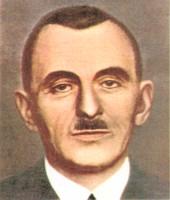 The Dinaric group, about 15% of the German population, is found mainly in the South and Southwest, and in central Germany. Outside the Reich, they are in England, in the eastern Alpine lands (their name comes from the Dinaric Alps) and in the Balkans as far as Ukraine. Tall and slender, average 1.74 meters, their skull is shorter, especially in the back. The nose is high and fairly large, the skin slightly brownish, the hair fine, brownish-black to black, and more abundant on the body than the other German groups. The eyes are also dark.
The Dinaric group, about 15% of the German population, is found mainly in the South and Southwest, and in central Germany. Outside the Reich, they are in England, in the eastern Alpine lands (their name comes from the Dinaric Alps) and in the Balkans as far as Ukraine. Tall and slender, average 1.74 meters, their skull is shorter, especially in the back. The nose is high and fairly large, the skin slightly brownish, the hair fine, brownish-black to black, and more abundant on the body than the other German groups. The eyes are also dark.
The Dinaric has some outstanding attributes of mind and soul. He is proud and brave, a good warrior with great love for his homeland. He has more creative ability than the Eastern man, but is more subject to his moods than the Nordic. He is noisier and more loquacious, and exhibits a great gift for music.
The Eastern (2nd largest) and East Baltic
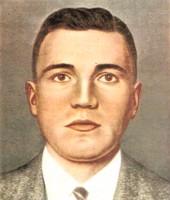 The Eastern (or Alpine) race group makes up 20% of Germans, second only to the Nordic, but most unlike the Nordic. His average height is only 1.63 meters, is more thick-set, compact and clumsy. He reaches sexual maturity early and also reaches old age earlier. His skull is short, wide-faced and rounded, the nose is set lower, the skin more yellowish, not as delicate as the Nordic's. The hair is thicker and tighter, brown to black; eyes brown. In spiritual attitude, the Eastern men are courageous but not rash and bold. They are unwarlike, more inclined to craftiness. Gunther says they make compliant and submissive subjects, never the leaders.
The Eastern (or Alpine) race group makes up 20% of Germans, second only to the Nordic, but most unlike the Nordic. His average height is only 1.63 meters, is more thick-set, compact and clumsy. He reaches sexual maturity early and also reaches old age earlier. His skull is short, wide-faced and rounded, the nose is set lower, the skin more yellowish, not as delicate as the Nordic's. The hair is thicker and tighter, brown to black; eyes brown. In spiritual attitude, the Eastern men are courageous but not rash and bold. They are unwarlike, more inclined to craftiness. Gunther says they make compliant and submissive subjects, never the leaders.
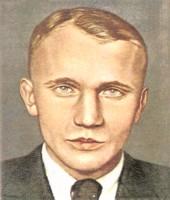 Finally, the East Baltic type, making up about 8%, is on average only 1.64 meters tall but large boned, with great shoulder breadth, and is more energetic than the Eastern man. He seems to mature rather late but still begins to age early. His skull is short and wide-faced, it is however bonier and more angular than the Easterner. The nose is set low and is rather broad. The skin is light, with a grey-yellow tinge. The hair is thick and coarse, blonde; the eyes can be grey, blue-grey to water blue. These men are not leaders by nature, but need leadership. They are cautious, seldom resolute for lack of real power of decision in conflicts. Creatively, they are best in the field of music.
Finally, the East Baltic type, making up about 8%, is on average only 1.64 meters tall but large boned, with great shoulder breadth, and is more energetic than the Eastern man. He seems to mature rather late but still begins to age early. His skull is short and wide-faced, it is however bonier and more angular than the Easterner. The nose is set low and is rather broad. The skin is light, with a grey-yellow tinge. The hair is thick and coarse, blonde; the eyes can be grey, blue-grey to water blue. These men are not leaders by nature, but need leadership. They are cautious, seldom resolute for lack of real power of decision in conflicts. Creatively, they are best in the field of music.
In summation, the Nordic is the most widely represented “race” in Germany. But this is not to say that half of our people are pure Nordic. All the above mentioned “races” appear in mixtures in all parts of our fatherland. “The circumstance, however, that the great part of our people is of Nordic descent justifies us in taking a Nordic standpoint when evaluating character and spirit, bodily structure and physical beauty. It also gives us the right to shape our legislation and to fashion our state according to the outlook on life of the Nordic man.”
My comment
I note that there is no mention of 'supremacy,' of 'overman' or 'underman' or 'superman.' It is all written in a modest, reality-based style. We do find the standard of leadership being foremost in consideration of value, which is understandable since the main purpose of the Hitler Youth was to prepare leaders for the future Reich.
There is full acknowledgement that these six racial types are intermixed in the German population--thus there is no status attached to one type of German over another, one locale over another. Loyalty and leadership appear to be given the most attention, along with creativity. Wherever those qualities appear in the youth, both male and female, they are given opportunities for further development through responsibility. Nothing could be more fair, populist and productive of success.
Could we use some of that today?
Category
National Socialism, Race, Schooling Hitler Youth- 2031 reads










Comments
An interesting article.
An interesting article.
A fair assessment given the
A fair assessment given the zeitgeist of the times, I should write one up on the representation of the White Man in North America!! What a dogs breakfast that would make...Just think, after accounting for smatterings of "..Native.." , African, Latino, and all the other European races from the Mediteranian to the North Atlantic, not to mention the Asiatic contributions..., bound together by a dominant White genome.., you'd have a regular Doctorate Thesis on your hands!!!
Okay
Do it! I will publish it.
What is the quote again from AH...
...Regarding his feelings about the good-natured Germans being easily led astray by certain foreign elements?
My family is from Westphalia, Han's book does a pretty good job of describing us physically, intellectually and emotionally, IMHO.
I identified with the Phalic
I identified with the Phalic German too! And Hans does link it to Swabia, from whence my ancestors came. Not that we're pure types; from this I can identify with Nordic, Phalic, Eastern (Alpine), and Dinaric. My father definitely Nordic, my mother's side with a lot of Eastern but with Nordic looks popping out in some family members. I do think the Phalic sounds like the best of all, but as you say, maybe too cordial for our own good, considering the liberal politics in both Westphalia and the Stuttgart area. Thanks for pointing that out.
Yes, likewise - I did
Yes, likewise - I did identity with some of the statements about hair colour and texture. As a side note, when I was younger, I was often told I looked like the Schumacher brothers (of F1 racing) - then I looked them up, they come from Westphalia. Go figure!
I am keen to find that exact quote from AH - what was it again, do you recall? Something like "he felt his germans were to trusting of..." ...? I'll have to keep searching, but it seems like google's search result on this "senstive" topic are not what they used to be.
BTW, I sent you a couple of e-mails recently, to the account you used last time to write to me. I hope you don't mind. Just some musings on the current state of affairs...
AH quote inquiry
These passages from MK are close, but not it:
"I say this because, unfortunately, scarcely any other people in the world has ever fallen a prey to this nonsensical and illogical idea to the same degree as our own."
"Scarcely any other people is made to study as much history as the Germans, and scarcely any other people makes such bad use of its historical knowledge."
Do you have any further details? "he felt his germans were to trusting of..." sounds like it comes from a memoir or historian.
Hi Janus,
Hi Janus,
Thanks for looking for this quote for P-K. I haven't even tried, but if anyone could find it, it would be you. Hitler often spoke with chagrin of this particular weakness in the German people, didn't he. We're still speaking of it today; it hasn't changed. It would be good to pinpoint it a little better. It fits well with the topic of the racial character qualities being discussed in the Hitler Youth Handbook that I'm posting now. What is this particular trait connected to?
Quote Search
Hi Carolyn,
Apologies for the delay in responding. Regrettably my search for Germans being too trusting towards foreign help has turned up nothing exact so far. I need further details from P K. I haven't checked Rudolf Hess's testimony or the memoirs of Hermann Giesler and Otto Wagener yet.
It's certain that Hitler viewed Germans this way. I suppose this September 10, 1943 excerpt from Goebbels' Diaries would be a good place to start from: "Once again our old German inheritance, our sentimentality, has had evil consequences when applied to politics." The key search term here being "sentimental".
I concur that it'd be ideal to track it down, and while we're at it, how about some of his maxims? He claimed that "god loves those who demands the impossible" (which I used as a motto for my site) was German in origin. Definitely not Greek. The closest I've come to tracking it down is in Moltke.
That's a good question, I'm not so sure myself. However, I did stumble across a quote from OW which said that Germanic/Roman mixtures had "the disadvantage of being unstable".
It reminded me of Table Talk entry June 24, 1943 which alludes to Beethoven being of the Alpine race. Also: "The inspiration is of Slavonic origin, the art of composition is of Germanic."
His claim that the British never had a great composer like Beethoven (due to them being purely Germanic) occurs in both a November 8, 1939 speech and Table Talk, has become one of my preferred starting arguments when arguing for Table Talk reliability.
We can perhaps descry from the British characteristics a glimpse of what the original Germans were like.
"The Germans, too, once possessed that sense of insular security which is such a source of strength to the British... It was the Peace of Westphalia which was the foundation of the permanent weakness of modern Germany." (Table Talk, August 26, 1942)
I have written to P-K and
I have written to P-K and asked him to read your comments. He has a busy life and doesn't actually get back here - doesn't spend as much time on the Internet as we do, haha. But I don't think he can be any help from what he said to me previously -- he just remembers the gist of it but can't remember where it came from. I agree with you that Hitler did see the Germans this way, but he also saw them as the best, most reliable Europeans, that he could count on. So he wasn't all negative, just would have liked a more militant people (he thinks, maybe he really wouldn't have liked it if he had it!).
I like the Goebbels' diary quote you found and think that really exemplifies the affectionate but baneful attitude of the "Nazis" toward that German soft-heartedness that could show up at all the wrong times!! People who believe that Germans are sadistic and cold could not be more deluded. What Germans have is a devotion to duty that keeps them disciplined and following the rules, which any leader would appreciate. Germans are very civilized and certainly don't enjoy being mean.
I'm quite sure there is nothing like what we're looking for in Giesler's memoir. The best place to find it would be Table Talk, and after that Mein Kampf. It probably wasn't said just the way P-K remembers it either.
Your further remarks about where this "weakness" came from are interesting. It had never occured to me that the English were more German than the Germans! But didn't the Norman invaders mix with the native Britons (maybe Celts?) to form the English, so would not be pure Germanic?
I'll have to look into the Peace of Westphalia again, with this in mind. Thanks.
Hmm did my previous reply to
Hmm did my previous reply to this post not go through? I wasn't ignoring you. I'll have to compose it again later.
It was not approved
What I wrote didn't require an answer.
For the future, if your tendency is to repeat long sections of the prior comment in order to answer it, please do it in an email, not here. Thank you.
Apologies for the late reply...
Hi Janus,
I'm sorry I haven't got much more to add to it than that. I do believe it was a quote, but then, it was some time ago that I came across it, so I cannot be 100% sure.
The gist was, that he felt "his Germans" (the "his" part is interesting) were a little too much of a trusting (insert synonym of choice) character, especially when they encountered more, shall we say, predatory ethnicities ;-)
It's easy to intepret this negatively, but it could also be seen in a positive light - we choose to approach the world openly and do not expect the worst of it? That's my take anyway.
Regards,
P-K
P.S. I do find your site interesting. Many moons ago you directed me to it over at RT. Certainly a gold mine of interesting quotes to say the least.
Let's remember also that
Let's remember also that published quotes are not always accurate ... re the "my" Germans. Who would he have been talking to with that?
This is a fair point! I
This is a fair point! I cannot be sure. Maybe I'll find the quote again one day - if I do, I'll post it.
Re: Your last e-mail.
Carolyn, it looks like my mail account's provider has black listed your domain's mailserver!
I will try sending through another e-mail in a moment, hopefully it's just a temporary thing... I did check with the DNSBL and your mail server's IP was not on it, so I think it should be okay again.
Quote Inquiry (cont.)
Hi P-K,
Your mention of RT has indirectly proven helpful in my search. Are you sure "my Germans" was said by Hitler and not by someone like Himmler? RT had an article which featured an apparent citation from HH: "I know quite well my Germans. The German always likes to think himself better but I would like to avert this."
Which prompted me to drop my Hitler-centered search and instead focus on known associates and historians of Himmler. This was the closest I could find, from Felix Kersten's memoirs (p.g. 25):
"These poor misguided people believe they are serving a great humanitarian ideal, quite unaware of how they are being abused. This is especially true of our good Germans, who are always ready to be taken in by any ideological swindle."
True, as optimists. Didn't Hitler say in the Table Talk that young people are naturally optimists? Germany, one of the younger European nations and with great vitality left in it!
Oh we've had a discussion before, that's surprising. Weren't you the one who commented on my usage of the term "hylozoic"?
What's RT like nowadays? After that controversy over Poles (on Hitler's birthday!) and the ganging up of American commenters on two dissident German commenters (Lotti and Sigrun, the former whom I happened to meet on YouTube some time afterward), I couldn't be botherd to post there anymore.
Thanks! Have you seen my recent section on musical people and Catholics? I know that Hermann Rauschning has been thoroughly discredited, but I think his testimony shouldn't be hastily dismissed.
Hi Janus,
To be honest, I'm really not sure if it was AH who said it, or if it was said of him. It was simply too long ago. I might have kept a copy of it somewhere, but my filing is a bit of a mess. If I find the quote again, I'll post it. I wouldn't worry about it too much, I just felt the sentiments were interesting considering all the "master race" propaganda, to admit that a "flaw" exists after all.
Yes, we exchanged a couple of comments over at RT. You asked me once what I thought AH actually believed. I believe this was in response to an article on Barabarossa (always controversial) and I expressed the sentiment that not only Germany would have been saved had it succeeded, but greater Europe. In hindsight I should have mentioned that I feel that the whole world would be radically different - better for it. But I doubt that would have ressonated with the crowd over there.
But I couldn't tell you what's going on there anymore. I never saw the controversy over the Poles on AH's birthday. Poor Lotti. I was banned after leaving some dissenting comments after the NZ shooter debacle. Ironic, I know - considering their supposed stance on free speech and censorship. I was never rude, I just proffered my opinion as someone who has the smallest clue about video compression on just what can (or cannot) be discovered from that highly compressed footage. What I got in return was incredibly rude, childish insults and all of my posts deleted.
Who has time for this?
ANYWAY, I was more or less only interested in revisionist articles on NS, not the daily outrage. I frequently clashed with the WN element over their world views and excessive "racism" (not sure how else to put it?) Now I have completely washed my hands of them. This is the only site I comment on anymore, when I have the time for it that is.
I'll have to pay your site a visit again. I have no pre-conceived notions on Rauschning, so I'll let you know what I think some time later. Cheers!
Hi P-K,
Afaik Hitler and Goebbels often said "we Germans" in speeches and writings. Himmler seemed more possessive. I'll leave the possibility that Hitler may have said "my Germans" open for now. Goebbels admitted to German inadaquecy in administering the nations. [...]
[The rest of the personal chit-chat clipped as inappropriate for this space. -cy]
Email
Well P-K, I guess we'll have to take this discussion to email (I don't know yours). Please use the contact form on my site or send an email to [email protected].